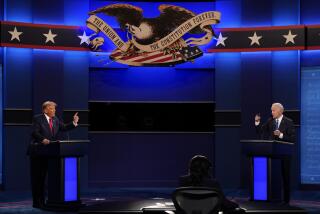Oratory Fails in Dealing With Complexities on TV
- Share via
“Every form is accompanied by an inclination,” St. Thomas Aquinas wrote. We hear a good deal today about how complex our lives have become, about the multifaceted possibilities of the emerging high-tech society. But the form of our public discourse tells a different story. Sequential arrangements of 60-second TV spots that pass for discussions of vital issues hardly bespeak a society that is learning to deal with complexity. Consider a few historical comparisons.
Probably the most splendid product of the art or oratory in the classical world was Demosthenes’ speech “On the Crown.” Much of what was actually spoken in the course of its presentation has been lost to us, but the incomplete text we have runs to 64 pages. The text of Edmund Burke’s speech, “On Conciliation With the American Colonies,” fills 50 pages, Webster’s “Reply to Hayne,” 46. Henry Clay introduced the compromise of 1850 by speaking for nearly six hours over two days. In the most famous American political debates, those between Abraham Lincoln and Stephen Douglas, each man spoke for an hour and then each had a 30-minute rebuttal. One of their debates went on for more than seven hours.
Bite-Sized Pieces
What we call political “debates” these days tend to consist of 90 minutes fragmented into one- or two-minute ejaculations by anywhere from two to eight candidates. Thus the discourse of our leaders follows the form set by commercial television and is reduced to bite-sized pieces; brevity vanquishes wit. Do we believe, do even the journalists who stage these charades believe, that anyone could give a good argument for a complex public policy in 60 seconds? Of course, candidates do not even attempt to do so. Rather than giving us good reasons and sound evidence, they shamelessly engage in combat by cliche. And it is easy for them because even the most complex of public issues have been conveniently pre-packaged into facile simplifications by the evening news and its partner in crime, the public opinion poll.
Whatever the virtues of this approach, it gives the lie to the self-serving twaddle we hear about the growing complexity of our society. Our machines may be growing more complex, but our ways of thinking are by and large becoming more primitive. Our great paradigm of newness and technology, television, is imposing forms of discourse on us which compel us to think like children about adult problems. If we let commercial television be our tutor, our minds will never grow up, because it treats us all as if we had the attention spans of children.
Provocative Commentator
Neil Postman, professor of communication arts and sciences at New York University, has long been a provocative commentator on modern culture. He has written a book about the impact of television, delightfully titled “Amusing Ourselves to Death.” In an interview recently he was asked whether Americans of the present generation are “dumber” than those who followed the Lincoln-Douglas debate for seven hours. He answered: “In a way I think we are. I think, almost by definition, if you have a population that no longer is able to follow complex arguments, you could say that it is dumber than any audience that once could.” I’m glad he said that. Now I don’t have to.”
The bulk of the commentators are right about one thing: The consequence of the changes in our society is that the burden on our schools is greater than it has ever been before. But this is true not because what students receive from the other conduits of thought and values in our society is too complex. Au contraire: it is too simple.






